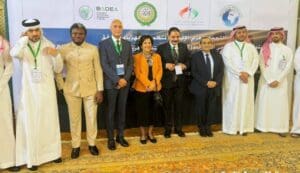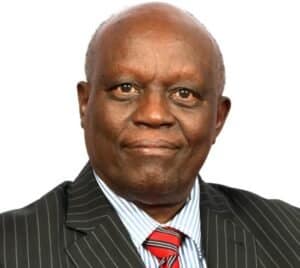Officials of the Arab Electricity Regulators Forum (AERF) and African Forum for Utility Regulators (AFUR) in Cairo Egypt. PHOTO/UGC.. By FRANLIN N. KWENAH. in Monrovia, Liberia. newshub@eyewitness.africa. As global efforts to combat climate change intensify, countries like Liberia stand at the crossroads of economic opportunity and environmental sustainability.. Liberia’s wealth of natural resources positions it uniquely to contribute to the global fight against climate change while fostering national growth. Despite the country’s abundant renewable energy potential, the energy sector remains largely underdeveloped.. However, Liberia has the opportunity to harness its untapped resources, such as hydropower and solar energy, to address both energy access and climate goals.. Liberia’s Energy Challenge and Opportunity. Liberia is rich in natural resources, yet access to electricity remains a significant challenge. With only about 20% of the population connected to the national grid, and most of that in the capital, Monrovia, the vast majority of Liberians lack reliable access to electricity.. This energy gap hinders economic development and exacerbates the challenges of climate change mitigation. However, Liberia’s abundant renewable energy resources, particularly hydropower and solar, offer a promising path forward.. The government, under President Joseph Nyuma Boakai, Sr., has recently taken crucial steps to improve energy access and foster economic growth. A key initiative in this regard is Executive Order No. 138, which provides tax exemptions for the Liberia Electricity Corporation (LEC) to facilitate the expansion of electricity access across the country.. This order removes customs duties and the Goods and Services Tax (GST) on essential equipment for energy generation, transmission, and distribution, as well as on fuel costs, including heavy fuel oil (HFO), to stabilize electricity prices. By reducing costs, the LEC can expand its customer base, modernize its transmission systems, and offer more affordable electricity to Liberians.. “This is a critical step toward driving economic resilience and improving public service delivery in Liberia,” President Boakai said in a recent statement. He emphasized that the government’s focus is on supporting key sectors, including energy, to improve the quality of life for all citizens.. Financial and Infrastructure Challenges. Despite the positive policy steps, financing and infrastructure development remain major challenges. The scale of investment needed to modernize Liberia’s energy sector is substantial, and while Liberia has made progress in securing international climate financing, more investment is required.. International organizations such as the Green Climate Fund and the World Bank have been instrumental in providing funding, but the country’s energy transition will require sustained investment in renewable energy infrastructure, particularly in rural areas where access to electricity remains limited.. At the COP29 summit, the Liberian government emphasized the need for increased financing to support climate mitigation and adaptation. Liberia’s vulnerability to climate change—manifested through rising sea levels, deforestation, and unpredictable weather patterns—makes the development of clean and affordable energy solutions all the more urgent.. The Promise of Renewable Energy. Liberia’s renewable energy potential is vast and largely untapped. The country’s rivers, including the St. Paul, Cavalla, and Lofa rivers, present enormous potential for hydropower generation.. With an estimated hydropower capacity of over 1,000 MW, less than 20% of this potential is currently in use. Expanding hydropower could significantly increase the country’s electricity supply and help meet both domestic and regional energy demands.. Solar energy is another key resource. Liberia receives abundant sunlight year-round, making it ideal for decentralized solar power solutions, especially in rural areas that lack access to the national grid.. In recent years, private sector investments and international partnerships have begun to explore solar energy solutions, with small-scale solar projects helping to bring power to off-grid communities.. One example is a 25 kW photovoltaic (PV) solar plant in Totota, Bong County, operated by the Liberia Engineering and Geo Technology Company. The plant supplies electricity to over 40 households and businesses, and it is backed up by a diesel generator to ensure reliable power in the event of insufficient sunlight.. The project, commissioned by former President Ellen Johnson Sirleaf in 2016, is an example of how solar energy can provide reliable, off-grid power to underserved communities.. Liberia’s Global Role in Climate Mitigation. Liberia’s transition to renewable energy is not only about domestic benefits but also about contributing to global climate action. As a signatory to the Paris Agreement, Liberia has committed to reducing greenhouse gas emissions and increasing its climate resilience.. The country’s Nationally Determined Contributions (NDCs) include a commitment to reduce dependence on fossil fuels and accelerate the adoption of renewable energy sources.. Liberia’s renewable energy transition is supported by a range of international partners. In Cairo, Egypt, the Liberia Electricity Regulatory Commission (LERC) has been actively participating in the Arab Electricity Regulators Forum (AERF) and the African Forum for Utility Regulators (AFUR), where key discussions on energy regulations, cross-border energy trade, and infrastructure development are taking place.. These forums foster regional collaboration and partnerships that are critical for advancing energy security and efficiency.. International development organizations such as the United Nations Development Programme (UNDP), the European Union, and the United States Agency for International Development (USAID) are providing technical assistance, policy advice, and funding to support Liberia’s energy transition.. Additionally, the World Bank has played a key role in financing large-scale energy infrastructure projects, including the rehabilitation of the Mount Coffee Hydroelectric Plant, which has been pivotal in expanding Liberia’s power supply.. The African Development Bank (AfDB) has also been a significant partner in the development of renewable energy in Liberia. Through the New Deal on Energy for Africa initiative, the AfDB has worked with Liberia to create a roadmap for scaling up energy access through renewable sources such as solar and wind energy.. A Call for Action. As Liberia moves forward with its energy transition, several key actions are essential for ensuring that the country’s energy future is clean, safe, and affordable. First, the government must continue to strengthen its policy and regulatory frameworks to promote renewable energy development and create an environment that attracts private investment.. Second, expanding and modernizing the electricity grid is crucial to connect more Liberians to the national grid, particularly in rural areas, while supporting off-grid solutions.. Additionally, investing in the skills and capacity of the next generation of energy professionals will be critical for managing and maintaining renewable energy systems. Training technicians, engineers, and other energy experts will ensure that Liberia has the human resources needed to sustain its energy transition.. Lastly, Liberia must continue building strong partnerships with international development partners to mobilize financing and technical expertise for large-scale renewable energy projects. With the right policies, investments, and partnerships, Liberia can unlock its renewable energy potential, reduce its carbon footprint, and provide millions of people with access to clean, affordable energy.. In doing so, the country will not only meet its domestic energy needs but also make a meaningful contribution to global climate mitigation efforts, ensuring a sustainable future for its people and the planet.. Liberia stands at a critical juncture in its energy transition, with an opportunity to harness its abundant renewable resources to drive economic development, improve energy access, and contribute to global climate goals.. By continuing to invest in renewable energy infrastructure, strengthening policy frameworks, and fostering international partnerships, Liberia can transform its energy sector, mitigate climate change, and provide a brighter, more sustainable future for its citizens.

